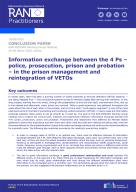Details
- Publication date
- 3 July 2023
- Author
- Directorate-General for Migration and Home Affairs
- RAN Publications Topic
- Prison and probation
Description
In recent years, there has been a growing number of violent extremist or terrorist offenders (VETOs) entering — and being released from — the correctional systems across EU Member States after serving their sentence. In this long process, starting from the arrest, through the preparations to and the trial itself, imprisonment time, and up to the release and afterwards, many actors are involved. While a great experience was gathered throughout the years about the role of each actor in the process, and at a time when “multi-agency approach” is one of the most used buzz words in the field of preventing and countering violent extremism (P/CVE), in many cases the information exchange between these actors is not as smooth as it could be. The goal of this RAN PRISONS Working Group meeting was to explore the various tools, methods and experiences related to information exchange between the 4 Ps: police, prosecution, prison and probation. Practitioners and researchers from different EU Member States gathered to share their experience and learn from each other what key tools and methods are being used, what are the preconditions for the implementation of good information exchange practices and what are the recommendations for successful ones.
The following key outcomes summarise the meeting’s overarching insights:
- In order to manage cases of VETOs in an optimal way, there must be effective channels of information exchange between the 4 Ps. With effective information exchange, every actor can perform their role in the best way, as they will have the widest available information about the case, such as, personal background, tendency to participate in disengagement, deradicalisation and resocialisation (DDR) programmes, social circles, behaviour during imprisonment and so on. As these four actors are active in different parts of the route the offender goes through, each of them acquires relevant and partially diverse information and can enrich the other actors with the relevant data.
- The key to good information exchange is good professional relationships and trust between the different actors, in this case the 4 Ps. When there are no legal frameworks for information exchange, and even when they do exist, good relationships and trust among the different stakeholders allow more information to be exchanged and in a smoother way. The participants agreed about the need to formalise the process, but also suggested that personal relationships are an important factor in it.
- Legislation and legal infrastructures for information exchange will dismantle concerns by the different actors concerning the exchange itself. In many cases there is a fear of sharing personal information of inmates or actions/methods implemented by the 4 Ps. A formal legal framework will ensure constant exchange and reassure the different stakeholders that they are acting within legal and legitimate boundaries. When a law formally allows people to meet and exchange, cooperation is easier and more effective.
- Often the main actors regularly meeting within the framework of a multi-agency approach in managing and integrating VETOs are police, prison and probation. Prosecution holds extensive knowledge about the inmates, as prior to them entering prison the prosecution gathers relevant data. Therefore, including them in the information exchange channels can benefit the work of the other actors, and especially the reintegration of the inmates, as this information can support decisions about DDR programmes and a housing regime. Information exchange between the 4 Ps and not only 3 Ps can contribute massively to the process.
- Case conferences, bringing relevant actors together around a table in an institutionalised framework to assess and manage risks, examine the prisoner’s progress and decide on tailor-made rehabilitation plans, and are effective tools for information exchange. The model can be hybrid and consists of regular periodical meetings between different actors, including judicial actors, local authorities, security agencies, prison and probation, social, youth and health workers, and exit counsellors. In many contexts, these take place mainly in relation to security-relevant cases. Intensity can also vary according to the situation and the needs, with more frequent meetings, for example, approaching release dates and less frequent ones when detention time left is long. Case conferences allows deepening relationships among the partners, which contribute to their mutual trust and make information exchange easier.
- In many cases, information exchange evolved or was legally conceptualised after an unfortunate event that might have been prevented if a system already existed. Like many aspects of P/CVE, comprehensive understanding of the needs comes after a violent attack. In France and the Netherlands for example, the normative frameworks were introduced after terrorist incidents several years ago.

